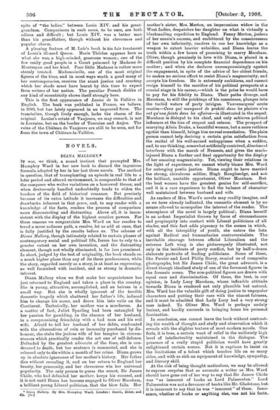LOUISE DE LA VALLIERE.* THE late N. Lair's Life of
Madame de la Varner° is in many ways an example of what such a book should be. Everybody knows into what pitfalls a writer may descend who finds himself in possession of all the available materials for a story of the French Court in the seventeenth century. Never was the faculty of choice, the tact of discerning between truth and falsehood, reasonable fact and preposterous gossip, more necessary. One has met with examples of the worse kind of biographer who make one thankful for the better. M. Lair treats his subject with good taste and delicacy, fairness and candour. He is gentle with the weakness of Louise do In Valliers, but be does not make light of her sin and sorrow. On the contrary, she has his full sympathy in the retirement to the Carmelite convent which fittingly ended one of the most romantic and saddest of courtly careers. No mockery of religion is to be found in 31. Lair's pages, yet they lack nothing of French gaiety and grace. As to Louis X1V., he is let off rather easily, yet it is a wonderfully good portrait. We are made to understand the attractiveness of the young man, spoilt, eager, boyish, passionate, yet cold-hearted ; handsome, stately, royal ; notwithstanding all critics, all gossips, far more actually "the Sing" than any predecessor, certainly than any successor, on the throne. We see what a &If existed, in
• Louise de la Talliere and the Early Life" °I Louis XIV. From Unpublished Documents, by Jules Lair, -Member of the Institute. Tranalatel from the Fourth.. French Edition by Ethel Colburn ,Mayne. With Illustrations.
London: Hutchinson and Co. 116s. net.] . .
spite of "the ladies," between Louis -XIV. and his great- grandson. Comparisons in such cases, to be sure, are both odious and difficult ; but Louis XIV. was a better man than his grandfather, though without his cleverness and popular charm.
A pleasing feature of M. Lair's book is his fair treatment of Louis's ill-used Queen. Marie Therese appears here as what she was, a high-minded, generous woman ; one of the few really good people in a Court poisoned by Madame de Montespan and her kind. Poor little Madame is rather more sternly treated. Mademoiselle, one of the most original figures of the time, and in most ways worth a good many of her contemporaries, receives the scant justice and courtesy which her shade must have learnt by this time to expect from writers of her nation. The peculiar French dislike of any kind of eccentricity shows itself strongly here.
This is the first appearance of Louise de he Valliere in English. The book was published in France, we believe, in 1880, but has lately appeared in an improved form. The translation, though lively enough, lacks the charm of the original. Louise's estate of Vaujours, we may remark, is not in Lorraine, but on the border of Touraine and Anjou. The ruins of the Chateau de Vaujours are still to be seen, not far from the town of Chiteau-la-Valliere.

























































 Previous page
Previous page